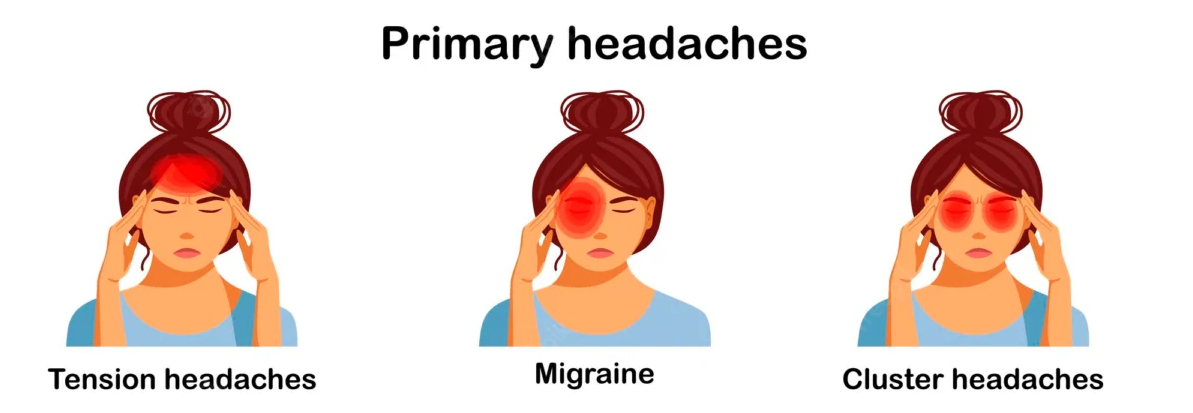THE RELATIONSHIP BETWEEN JAW PAIN AND HEADACHE Written By: Dr. Ankita Shah, 6 August 2023

Have you ever had a sore jaw and also found yourself dealing with a pounding headache? You’re not alone. This happens more often than you might think. The human body works as a unified system, connected through an intricate network of organs, tissues, nerves, and biochemical signals that facilitate proper functioning. One interesting example of this connection is the link between jaw pain and headaches.
It may seem like jaw pain and headaches are two separate issues, however, research shows that they are related. Tension headaches can feel like they start from our jaw, and problems with the jaw joint can often lead to headaches. This sheds light on the deeper connection between jaw pain and headache.
In this guide, we’ll explore jaw pain and headache in depth, understanding the causes of jaw pain and headache, taking a closer look at how they are interconnected.
A] Understanding Jaw Pain

In order to understand jaw pain, we need to understand the temporomandibular joint (TMJ), a jaw joint that acts like a hinge connecting your jaw to your skull. This is what lets you move your jaw up and down and side to side for performing actions such as chewing or talking.
Problems with this joint can lead to larger problems. Listed below are some common problems often associated with TMJ, which if not treated on time can lead to bigger problems:
Chronic pain in the jaw, face, and neck, and even headaches, make it challenging to perform everyday activities.
Restricted jaw movement leads to difficulties in chewing, speaking, and even breathing.
Audible clicking, popping, or grating sounds when moving the jaw can be bothersome and indicate underlying joint problems.
Ear pain, ear ringing, tinnitus, ear stuffiness, ear itchiness
Muscle tension and spasms in the face, neck, and shoulders contribute to discomfort and stiffness.
Disrupts the alignment of teeth and the bite, potentially causing dental issues such as tooth wear, attrition, teeth fractures, teeth sensitivity or even tooth loss.
Can lead to sleep disturbances
The chronic pain and discomfort associated with TMJ can lead to anxiety, depression, and decreased overall quality of life.
Jaw pain can manifest in different ways as listed below:
Sometimes, your jaw might feel sore or achy.
Other times, you could hear a clicking sound when you open your mouth or feel like your jaw gets stuck.
Limited mouth opening can be another sign, making it hard to open your mouth wide.
Understanding these causes and symptoms can help you figure out what’s going on and take steps towards feeling better.
B] Types of Headaches

Headaches can be troubling, but knowing the kind of headache you’re dealing with can help you manage them better. We’ll discuss the three main types of headache:
Tension headaches are like a tight band squeezing your head. They can feel dull and steady and often show up after a long day or when you’re stressed.
Migraines are a bit more intense. They come with throbbing pain, usually on one side of the head. Sometimes, you might feel nauseous or sensitive to light and sound. Migraines can be triggered by things like bright lights, certain foods, or hormonal changes.
Cluster headaches are less common but seriously intense. They come in “clusters,” meaning you get them for a period of time and then they go away. They often strike around the eye and can cause redness and tearing.
Additionally, jaw pain resulting from teeth clenching or grinding, often due to stress, an improper bite or airway obstructions, can contribute to the development of tension headaches and migraines.
While the exact cause of cluster headaches remains uncertain, there is evidence suggesting jaw issues such as temporomandibular joint (TMJ) disorders can potentially trigger or worsen these types of headaches. Understanding the type you have and what triggers it can help you find ways to prevent or ease the pain.
To learn more about these headaches and their connection with the TMJ disorder, refer to the guide: Are You Struggling With Headaches, Migraines And TMJ Disorder?
C] The Connection Between Jaw Pain And Headache

We have already seen the numerous ways jaw pain can be connected to headaches. In order to explain it better, let’s focus on the concept of referred pain, wherein pain from one location, like your jaw, shows up in another spot, your head. This happens due to the connection between the web of muscles, nerves, and joints. The hyperactivity of the temporalis muscles resulting from an incorrect bite and clenching will contribute to muscle tension and headaches in the temple region. To summarise, treating TMJ issues can also help relieve the resulting headaches.
Common Triggers
Certain everyday habits like clenching teeth, chomping on the gums, or poor posture can increase jaw pain and headaches. However, it’s not just physical triggers. Stress and tension also cause a headache with jaw pain. When you’re stressed, you might clench your jaw without even realising it, leading to discomfort in both your jaw and head. In the table below, you can observe the common triggers for jaw pain, headaches, and combined triggers for both.
| Jaw Pain Triggers: | Headache Triggers: | Shared Triggers (Jaw Pain & Headache:) |
|---|---|---|
| Teeth Clenching and Grinding | Stress and Tension | Stress |
| Chewing Gum | Poor Sleep | Dental Issues |
| Incorrect Bite Alignment | Dehydration | Bruxism |
| Trauma | Caffeine | TMJ Dysfunction |
| Poor Posture | Environmental Factors | Posture |
Paresthesia
Numbness
Tingling
Burning
Stiffness
Dull Ache
Intense Pain
Referred Pain
Deep & Aching At Rest
Mild to Severe Pain
Inconsistent Variable Pain
Tenderness of Skin in Region of Referred Pain
No Prickling, Numbing or Burning
Rarely Throbbing
Acute
Localised
Pain Reduced with Rest
Sharp, Knife Like
Pain On Movement
D] Seeking Relief and Treatment From TMJ Pain & Associated Headaches

It is possible to find relief from the TMJ pain and headaches with the help of simple strategies. You can try some Myofunctional Therapy, apply a heat or cold pack to ease muscle tension, or practise relaxation techniques to calm the nerves. You can also make sure to maintain good posture to alleviate strain on your jaw and head. Additionally, you can also try Jaw Exercises For Pain Relief From TMJ.
When it comes to treatment, there’s a range of options to explore, including a change in lifestyle shifts like stress management and adjusting chewing habits to specific therapies:
Myofunctional Therapy addresses improper muscle function that contributes to jaw pain.
Orofacial Pain Relief Therapy employs techniques to soothe irritated jaw joints and muscles.
Airway Orthodontics seeks to enhance breathing and jaw alignment.
GNM Orthotics employs specialised devices to optimise jaw movement.
Physiotherapy guides you through exercises to strengthen and rehabilitate jaw muscles.
So, if you are someone dealing with headaches and jaw pain everyday, it is necessary to gain timely help by consulting with a TMJ specialist.
Conclusion
In order to determine if your jaw pain and headache are related to each other, you need to consult a TMJ doctor for diagnosis.
If you suspect you have jaw pain causing headache or the other way around, a TMJ expert can help provide a custom treatment plan to put you on a path of recovery, helping ease your jaw pain and headache. So, reach out to us and say goodbye to the constant jaw pain and headache.
